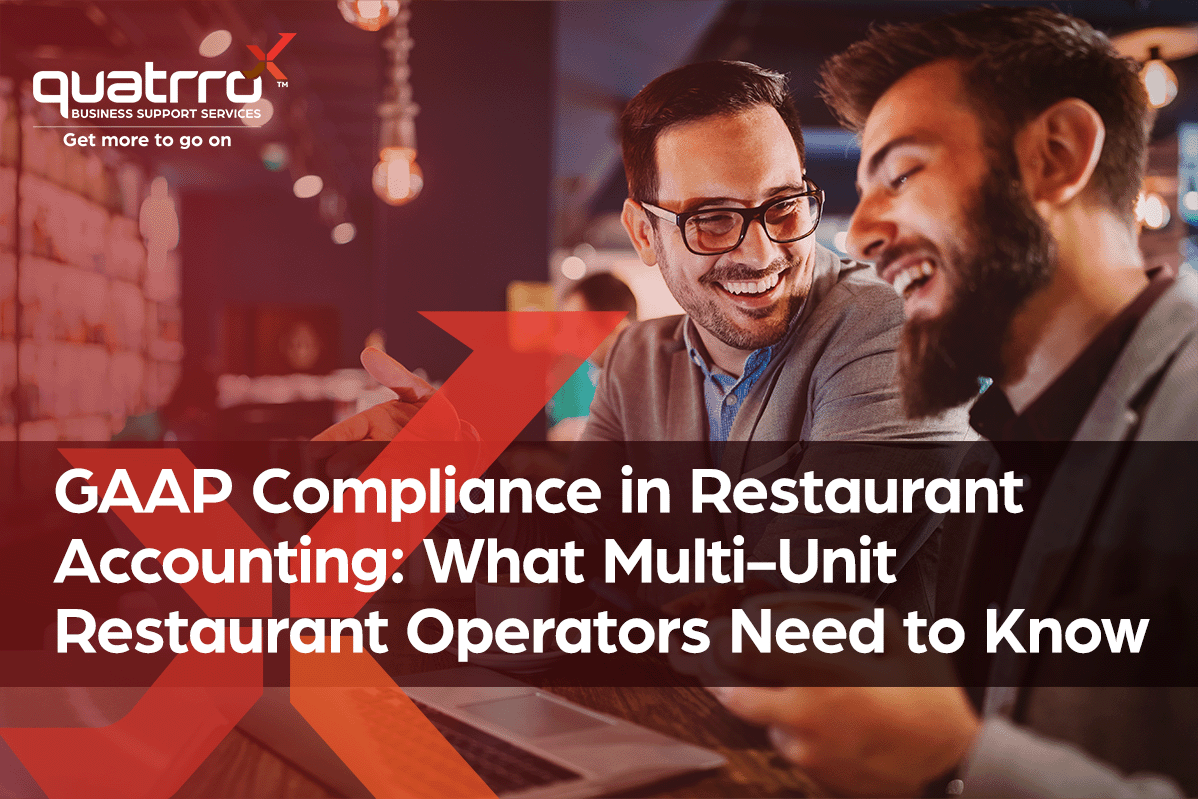Blog Details
GAAP Compliance in Restaurant Accounting: What Multi-Unit Restaurant Operators Need to Know
October 29, 2025

GAAP compliance in restaurant accounting means recording all financial activity in the period it actually occurs, with monthly balance sheet reconciliations that ensure your profit and loss statements are accurate and trustworthy. For multi-unit restaurant operators, this isn’t just an accounting technicality—it’s the difference between making business decisions based on solid data versus guesswork.
If you’ve ever questioned whether your monthly financials truly reflect your restaurant’s performance, or been surprised by financial issues that should have been visible months earlier, the root cause often traces back to GAAP compliance—or the lack of it.
GAAP-Compliant Approach:
Step 1: Find a Partner with GAAP Expertise – The right outsourced accounting partner can assess your current state, implement GAAP-compliant processes from day one, and provide the expertise and infrastructure you’d otherwise have to build in-house. This approach lets you focus on running your restaurants while experts handle the technical transition.
Step 2: Assess Your Current State – Your partner will help you evaluate your reconciliation frequency, adjustment timing, and any backlogs to create a clear picture of what needs to change.
Step 3: Create a Cleanup Plan – Be sure to let your accounting partner know up front you need them to complete outstanding reconciliations and help you clear backlogs. This can typically take 30-90 days depending on how far behind things have gotten.
Step 4: Implement Period-by-Period Processes – Monthly balance sheet reconciliations must become the standard, with financials delivered within 10-15 days of period close. The right partner scales services seamlessly as your operation grows.
A: While not legally required, GAAP represents accounting best practices, and anyone you share financials with—banks, investors, potential buyers, auditors—expects GAAP compliance. Starting when you need it is too late and much more expensive.
Q: We do quarterly reconciliations. Isn’t that close enough?
A: Quarterly reconciliations mean you’re making business decisions for 2-3 months based on unverified data. In an industry where margins are tight and conditions change quickly, that’s a significant blind spot.
Q: Will switching to GAAP compliance disrupt our operations?
A: The transition can be managed to minimize disruption. In fact, if you work with an outsourced accounting partner, most work happens behind the scenes while your team focuses on day-to-day activities. You’ll actually experience less disruption long-term because your financials will be reliable and timely.
Q: Can we implement GAAP compliance with our existing accounting software?
A: Yes. GAAP compliance is about process and timing, not specific software. The key is having the expertise and discipline to execute properly, not the technology platform.
Q: How quickly can we see benefits from GAAP compliance?
A: Many operators notice immediate improvements in decision-making confidence. Within 3-6 months, benefits become more apparent—better vendor relationships, improved cash flow visibility, and early trend identification.
Q: What’s the first step if we want to move toward GAAP compliance?
A: Have an honest conversation with your current accounting team or provider about what GAAP compliance would require. If they can’t, or won’t, implement GAAP-compliant processes, explore providers who can.
The question every multi-unit operator should ask: Am I making million-dollar decisions based on accurate data or just educated guesses?
If you can’t confidently answer that your financials are accurate, timely, and verified through proper reconciliation, you have a GAAP compliance gap putting your business at risk. The good news? Fixing it is more straightforward than most operators realize, especially with the right partner.
If you’ve ever questioned whether your monthly financials truly reflect your restaurant’s performance, or been surprised by financial issues that should have been visible months earlier, the root cause often traces back to GAAP compliance—or the lack of it.
What Exactly Is GAAP Compliance?
GAAP stands for Generally Accepted Accounting Principles—the standard framework for financial accounting in the United States. At its heart, GAAP requires accrual basis accounting—recording financial activity in the period when it happens, not when cash changes hands or when you get around to fixing errors.GAAP-Compliant Approach:
- Balance sheet reconciliations completed every period
- Errors corrected in the period the activity actually occurred
- Your P&L accuracy is guaranteed because your balance sheet is properly reconciled
- Quarterly reconciliations (or even annually in some cases)
- Errors and adjustments pushed to future periods
- Your P&L is essentially a best guess
Why GAAP Compliance Matters for Your Restaurant Operations
Accurate Decisions Require Accurate Data
The only way to guarantee your P&L is correct is through period-by-period balance sheet reconciliation. Consider this: You’re reviewing September financials showing strong profitability. Based on this, you approve raises and sign a lease for a new location. Three months later, during quarterly reconciliations, you discover a $50,000 inventory error from September. With GAAP compliance, that error would have been caught in September, before it influenced major business decisions.Financial Credibility When You Need It Most
GAAP compliance signals to the outside world that your business maintains professional accounting standards. This becomes non-negotiable when dealing with:- Private equity and investors who require GAAP financials
- Banks and lenders evaluating loan applications
- Potential buyers conducting due diligence
- Auditors who can’t work without GAAP compliance
Operational Stability
When balance sheet reconciliations happen quarterly instead of monthly, your accounting team is constantly playing catch-up with prior periods. This backlog means current invoices sit in queue while accountants work through reconciliations from months ago. The result? Bills that arrive in October don’t get processed until November or later, creating late payment penalties, strained vendor relationships, and potential service interruptions. Period-by-period processes prevent these costly disruptions by keeping your accounting current and eliminating backlogs.Growth Without Chaos
As you add locations, complexity multiplies. GAAP compliance provides the accounting infrastructure that scales with growth. Without it, each new location adds more uncertainty to your financial picture as existing issues begin to compound exponentially. The cost of non-compliance increases dramatically with scale—finding problems 3-6 months after they occur means lost time and money you can never recover. When you don’t trust your numbers, every decision becomes a gamble. Strategic opportunities slip away because your financial picture is unclear: investors you can’t engage with, acquisitions you can’t evaluate, and expansion opportunities you miss .How to Make the Switch to GAAP Compliance
Making the transition is more straightforward than you might think, especially with the right partner walking through the steps with you. Here’s how the process typically works:Step 1: Find a Partner with GAAP Expertise – The right outsourced accounting partner can assess your current state, implement GAAP-compliant processes from day one, and provide the expertise and infrastructure you’d otherwise have to build in-house. This approach lets you focus on running your restaurants while experts handle the technical transition.
Step 2: Assess Your Current State – Your partner will help you evaluate your reconciliation frequency, adjustment timing, and any backlogs to create a clear picture of what needs to change.
Step 3: Create a Cleanup Plan – Be sure to let your accounting partner know up front you need them to complete outstanding reconciliations and help you clear backlogs. This can typically take 30-90 days depending on how far behind things have gotten.
Step 4: Implement Period-by-Period Processes – Monthly balance sheet reconciliations must become the standard, with financials delivered within 10-15 days of period close. The right partner scales services seamlessly as your operation grows.
FAQs: GAAP Compliance for Restaurant Operators
Q: We’re not publicly traded. Do we really need to follow GAAP?A: While not legally required, GAAP represents accounting best practices, and anyone you share financials with—banks, investors, potential buyers, auditors—expects GAAP compliance. Starting when you need it is too late and much more expensive.
Q: We do quarterly reconciliations. Isn’t that close enough?
A: Quarterly reconciliations mean you’re making business decisions for 2-3 months based on unverified data. In an industry where margins are tight and conditions change quickly, that’s a significant blind spot.
Q: Will switching to GAAP compliance disrupt our operations?
A: The transition can be managed to minimize disruption. In fact, if you work with an outsourced accounting partner, most work happens behind the scenes while your team focuses on day-to-day activities. You’ll actually experience less disruption long-term because your financials will be reliable and timely.
Q: Can we implement GAAP compliance with our existing accounting software?
A: Yes. GAAP compliance is about process and timing, not specific software. The key is having the expertise and discipline to execute properly, not the technology platform.
Q: How quickly can we see benefits from GAAP compliance?
A: Many operators notice immediate improvements in decision-making confidence. Within 3-6 months, benefits become more apparent—better vendor relationships, improved cash flow visibility, and early trend identification.
Q: What’s the first step if we want to move toward GAAP compliance?
A: Have an honest conversation with your current accounting team or provider about what GAAP compliance would require. If they can’t, or won’t, implement GAAP-compliant processes, explore providers who can.
The Bottom Line
GAAP compliance isn’t about checking a regulatory box—it’s about having financial statements you can actually trust to run and grow your restaurant business.The question every multi-unit operator should ask: Am I making million-dollar decisions based on accurate data or just educated guesses?
If you can’t confidently answer that your financials are accurate, timely, and verified through proper reconciliation, you have a GAAP compliance gap putting your business at risk. The good news? Fixing it is more straightforward than most operators realize, especially with the right partner.
About Quatrro
Quatrro is a back-office outsourcing and advisory firm providing accounting, finance, HR, payroll, and IT solutions to multi-unit restaurant operators. We follow GAAP-compliant processes as our standard for all accounting work, with period-by-period reconciliations and next-day AP processing. With 25+ years of experience serving the restaurant industry, we help growing restaurant groups maintain the financial infrastructure they need to scale with confidence. Learn more at www.quatrrobss.com/industries/restaurant-retail/Latest Insights
Related Blogs
Contact Us







